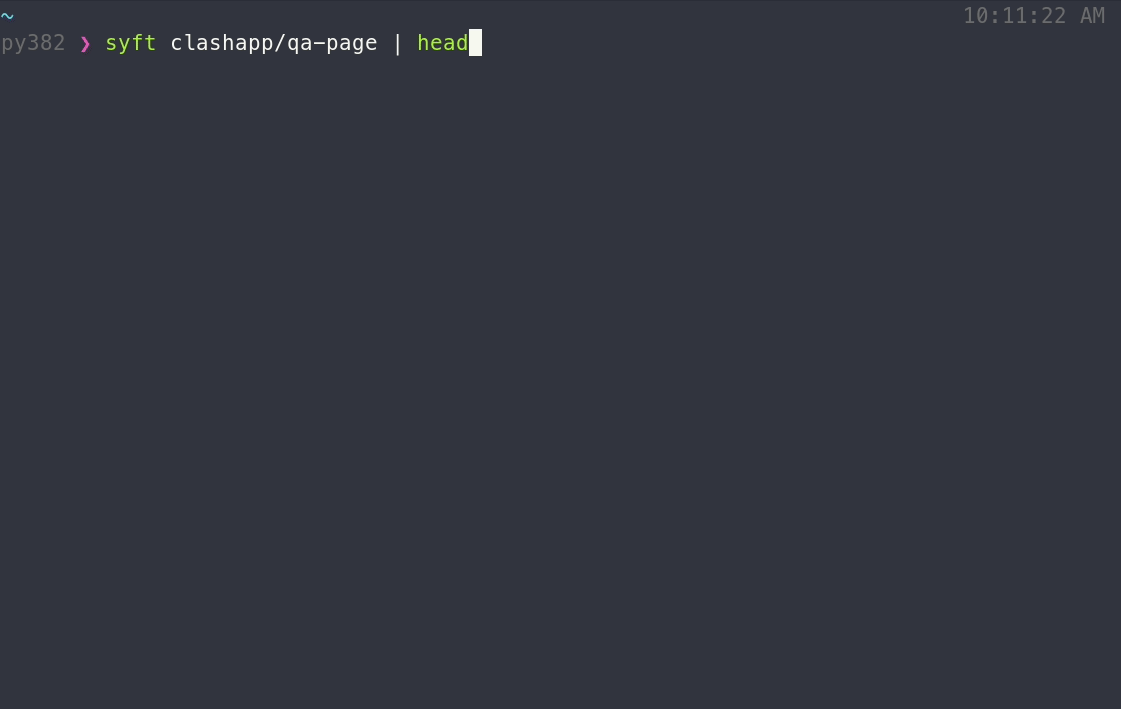 Documentation
¶
Documentation
¶
Overview ¶
Syft is a CLI tool and go library for generating a Software Bill of Materials (SBOM) from container images and filesystems.
Note that Syft is both a command line tool as well as a library. See the syft/ child package for library functionality.
 Directories
¶
Directories
¶
| Path | Synopsis |
|---|---|
|
Package internal contains miscellaneous functions and objects useful within syft but should not be used externally.
|
Package internal contains miscellaneous functions and objects useful within syft but should not be used externally. |
|
anchore
nolint:dupl nolint: dupl
|
nolint:dupl nolint: dupl |
|
bus
Package bus provides access to a singleton instance of an event bus (provided by the calling application).
|
Package bus provides access to a singleton instance of an event bus (provided by the calling application). |
|
log
Package log contains the singleton object and helper functions for facilitating logging within the syft library.
|
Package log contains the singleton object and helper functions for facilitating logging within the syft library. |
|
logger
Package logger contains implementations for the syft.logger.Logger interface.
|
Package logger contains implementations for the syft.logger.Logger interface. |
|
presenter/packages
Package cyclonedx is responsible for generating a CycloneDX XML report for the given container image or file system.
|
Package cyclonedx is responsible for generating a CycloneDX XML report for the given container image or file system. |
|
spdxlicense
Code generated by go generate; DO NOT EDIT.
|
Code generated by go generate; DO NOT EDIT. |
|
version
Package version contains all build time metadata (version, build time, git commit, etc).
|
Package version contains all build time metadata (version, build time, git commit, etc). |
|
schema
|
|
|
A "one-stop-shop" for helper utilities for all major functionality provided by child packages of the syft library.
|
A "one-stop-shop" for helper utilities for all major functionality provided by child packages of the syft library. |
|
event
Package event provides event types for all events that the syft library published onto the event bus.
|
Package event provides event types for all events that the syft library published onto the event bus. |
|
event/parsers
Package parsers provides parser helpers to extract payloads for each event type that the syft library publishes onto the event bus.
|
Package parsers provides parser helpers to extract payloads for each event type that the syft library publishes onto the event bus. |
|
logger
Package logger defines the logging interface which is used throughout the syft library.
|
Package logger defines the logging interface which is used throughout the syft library. |
|
pkg
Package pkg provides the data structures for a package, a package catalog, package types, and domain-specific metadata.
|
Package pkg provides the data structures for a package, a package catalog, package types, and domain-specific metadata. |
|
pkg/cataloger
Package cataloger provides the ability to process files from a container image or file system and discover packages (gems, wheels, jars, rpms, debs, etc).
|
Package cataloger provides the ability to process files from a container image or file system and discover packages (gems, wheels, jars, rpms, debs, etc). |
|
pkg/cataloger/apkdb
Package apkdb provides a concrete Cataloger implementation for Alpine DB files.
|
Package apkdb provides a concrete Cataloger implementation for Alpine DB files. |
|
pkg/cataloger/common
Package common provides generic utilities used by multiple catalogers.
|
Package common provides generic utilities used by multiple catalogers. |
|
pkg/cataloger/deb
Package dpkg provides a concrete Cataloger implementation for Debian package DB status files.
|
Package dpkg provides a concrete Cataloger implementation for Debian package DB status files. |
|
pkg/cataloger/golang
Package golang provides a concrete Cataloger implementation for go.mod files.
|
Package golang provides a concrete Cataloger implementation for go.mod files. |
|
pkg/cataloger/java
Package java provides a concrete Cataloger implementation for Java archives (jar, war, ear, jpi, hpi formats).
|
Package java provides a concrete Cataloger implementation for Java archives (jar, war, ear, jpi, hpi formats). |
|
pkg/cataloger/javascript
Package javascript provides a concrete Cataloger implementation for JavaScript ecosystem files (yarn and npm).
|
Package javascript provides a concrete Cataloger implementation for JavaScript ecosystem files (yarn and npm). |
|
pkg/cataloger/python
Package python provides a concrete Cataloger implementation for Python ecosystem files (egg, wheel, requirements.txt).
|
Package python provides a concrete Cataloger implementation for Python ecosystem files (egg, wheel, requirements.txt). |
|
pkg/cataloger/rpmdb
Package rpmdb provides a concrete Cataloger implementation for RPM "Package" DB files.
|
Package rpmdb provides a concrete Cataloger implementation for RPM "Package" DB files. |
|
pkg/cataloger/ruby
Package bundler provides a concrete Cataloger implementation for Ruby Gemfile.lock bundler files.
|
Package bundler provides a concrete Cataloger implementation for Ruby Gemfile.lock bundler files. |
|
pkg/cataloger/rust
Package rust provides a concrete Cataloger implementation for Cargo.lock files.
|
Package rust provides a concrete Cataloger implementation for Cargo.lock files. |
|
presenter/packages
Defines a Presenter interface for displaying catalog results to an io.Writer as well as a helper utility to obtain a specific Presenter implementation given user configuration.
|
Defines a Presenter interface for displaying catalog results to an io.Writer as well as a helper utility to obtain a specific Presenter implementation given user configuration. |
|
source
Package source provides an abstraction to allow a user to loosely define a data source to catalog and expose a common interface that catalogers and use explore and analyze data from the data source.
|
Package source provides an abstraction to allow a user to loosely define a data source to catalog and expose a common interface that catalogers and use explore and analyze data from the data source. |
|
Package ui provides all public UI elements intended to be repurposed in other applications.
|
Package ui provides all public UI elements intended to be repurposed in other applications. |
Click to show internal directories.
Click to hide internal directories.



